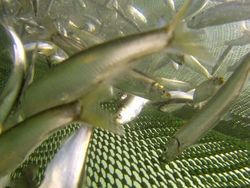Dossier
The signicficance of climate change for the oceans and the fisheries
Ismael Núñez-Riboni, Gerd Kraus
Climate change leaves visible marks not only on land: Also the ocean ecosystems will change, having consequences for the fishing sector and aquaculture.

Already in 2015, the fifth assessment report of the UN Intergovernmental Panel on Climate Change (IPCC) addressed the consequences of climate change on the oceans and the fishing sector. With a temperature increase of only 2°C above pre-industrial levels, significant losses in global fish catches are expected to be in the billion-dollar range by 2050. However, there will be significant regional differences.
In the meantime, the effects are also clearly noticeable in the North Sea, the Baltic Sea and the North Atlantic. Stocks of commercially important fish such as cod and mackerel have shifted further north, and other species are joining them from southern areas. A special situation arises for the Baltic Sea, which is bounded to the north by Scandinavia. Together with the special salinity and oxygen conditions of this near-inland sea, tight limits are placed on the possibilities for evasion and adaptation of the stocks found there. This has drastic effects on the herring stock in the western Baltic Sea, for example.








